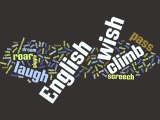A round up of languages in the news finds that babies can detect different languages, a boom of online language learning and the French aren’t happy about a particular English abbreviation
More than 100 million people are going online to learn a language
Writing in Wired, the co-founder of Babbel, a language learning tool, explains how technology is making language learning more accessible. Markus Witte says that more than 100 million people are now learning languages online.
Read more: Wired
The French say “non” to Anglicisms
The Académie Française has condemned the use of the abbreviation “ASAP” after its use has unfavourably slipped into the French lexicon. “This abbreviation of as soon as possible, which is far from transparent, seems to accumulate most of the defects of a language that hides its contempt and threatening character under the guise of modern junk,” the Académie said.
Read more: the Guardian
Babies can detect different languages
Researchers from the University of Auckland in Australia found that babies are able to understand that people who speak different languages use words differently. According to the study, infants can spot when speakers don’t share a language and that they’re using different words to refer to the same object.
Read more: Science Alert
What it’s like learning how to sign for your deaf child
A family talk about the challenges and triumphs they faced learning British Sign Language to communicate with their profoundly deaf four-year-old daughter.
Read more: the Guardian
All English primary schoolchildren will be learning languages by the end of the year
The BBC aired a segment this week about the move to make languages compulsory for all English primary schools from September 2014. The government recommended that schools teach a range of languages, opting for Mandarin over European languages.
Read more: BBC
via Education: Research | theguardian.com http://www.theguardian.com/education/2014/jan/10/languages-news-round-up-babies-technology
